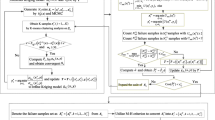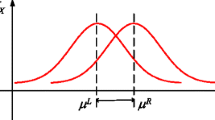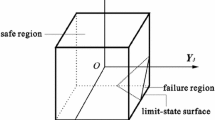Abstract
Aleatory and epistemic uncertainties, which coexist widely in the preliminary design phase of engineering structures, should be appropriately controlled for safety purposes. A methodology of hybrid reliability analysis and optimization based on chance theory is proposed in this paper. Random variables are adopted to describe aleatory uncertainty with sufficient statistical data. On the other hand, uncertain variables are used to quantify epistemic uncertainty with objective limited information or subjective expert opinions. More specifically, a metric termed chance measure is introduced to formulate a chance reliability indicator (CRI) for modeling structural reliability in the presence of hybrid uncertainty. Then, two CRI estimation methods denoted as crisp equivalent model and uncertain random simulation (URS) methods, are developed for the mixed reliability assessment. Furthermore, an efficient CRI-based design optimization (CRBDO) model is established under prescribed chance reliability constraints. Two solving strategies, including crisp mathematical programming and URS combined with genetic algorithm strategies, are presented to solve the CRBDO model and obtain optimal results. Finally, the performance of the constructed analysis model, as well as the feasibility of the corresponding solution technique, is verified by four engineering applications.












Similar content being viewed by others
References
Chen Y, Li S, Kang R (2021) Epistemic uncertainty quantification via uncertainty theory in the reliability evaluation of a system with failure Trigger effect. Reliab Eng Syst Saf 215:107896
Cremona C, Gao Y (1997) The possibilistic reliability theory: theoretical aspects and applications. Struct Saf 19(2):173–201
Du L, Choi KK, Youn BD, Gorsich D (2005a) Possibility-based design optimization method for design problems with both statistical and fuzzy input data. J Mech Des 128(4):928–935
Du X, Sudjianto A, Huang B (2005b) Reliability-based design with the mixture of random and interval variables. J Mech Des 127(6):1068–1076
Durga Rao K, Kushwaha HS, Verma AK, Srividya A (2007) Quantification of epistemic and aleatory uncertainties in level-1 probabilistic safety assessment studies. Reliab Eng Syst Saf 92:947–956
Fiessler B, Neumann H-J, Rackwitz R (1979) Quadratic limit states in structural reliability. ASME 105(4):669–670
Haftka R, Gürdal Z (1992) Elements of structural optimization, 3rd edn. Kluwer, Dordrecht
Hamza F, Ferhat D, Abderazek H, Dahane M (2020) A new efficient hybrid approach for reliability-based design optimization problems. Eng Comput
Hao P, Wang Y, Liu X, Wang B, Li G, Wang L (2017) An efficient adaptive-loop method for non-probabilistic reliability-based design optimization. Comput Methods Appl Mech Eng 324:689–711
Hoffman F, Hammonds J (1994) Propagation of uncertainty in risk assessments: the need to distinguish between uncertainty due to lack of knowledge and uncertainty due to variability. Risk Anal 14(5):707–712
Hohenbichler M, Rackwitz R (1988) Improvement of second-order reliability estimates by importance sampling. J Eng Mech 114:2195–2199
Hu L, Kang R, Pan X, Zuo D (2020) Risk assessment of uncertain random system—Level-1 and level-2 joint propagation of uncertainty and probability in fault tree analysis. Reliab Eng Syst Saf 198:106874
Huang H (2012) Structural reliability analysis using fuzzy sets theory. Eksploat Niezawodn—Maint Reliab 14(4):284–294
Huang B, Du X (2006) A robust design method using variable transformation and Gauss-Hermite integration. Int J Numer Methods Eng 66:1841–1858
Jiang C, Han X, Lu GY, Zhang Z, Bai YC (2011) Correlation analysis of non-probabilistic convex model and corresponding structural reliability technique. Comput Methods Appl Mech Eng 200(33):2528–2546
Jiang C, Zheng J, Han X (2018) Probability-interval hybrid uncertainty analysis for structures with both aleatory and epistemic uncertainties: a review. Struct Multidisc Optim 57:2485–2502
Kang R, Zhang Q, Zeng Z, Zio E, Li X (2016) Measuring reliability under epistemic uncertainty: review on non-probabilistic reliability metrics. Chin J Aeronaut 29(3):571–579
Ke H, Liu H, Tian G (2015) An uncertain random programming model for project scheduling problem. Int J Intell Syst 30(1):66–79
Ke H, Ma J, Tian G (2017) Hybrid multilevel programming with uncertain random parameters. J Intell Manuf 28(3):589–596
Kim J, Song J (2021) Quantile surrogates and sensitivity by adaptive Gaussian process for efficient reliability-based design optimization. Mech Syst Signal Process 161:107962
Kiureghian AD, Ditlevsen O (2009) Aleatory or epistemic? Does it matter? Struct Saf 31:105–112
Liu B (2007) Uncertainty theory, 2th edn. Springer, Berlin
Liu B (2015) Uncertainty theory, 4th edn. Springer, Berlin
Liu Y (2013a) Uncertain random variables: a mixture of uncertainty and randomness. Soft Comput 17(4):625–634
Liu Y (2013b) Uncertain random programming with applications. Fuzzy Optim Decis Making 12:153–169
Li H, Nie X (2018) Structural reliability analysis with fuzzy random variables using error principle. Eng Appl Artif Intell 67:91–99
Li H-S, Ma C (2013) Hybrid dimension-reduction method for robust design optimization. AIAA J 51:138–144
Li F, Liu J, Wen G, Rong J (2019) Extending SORA method for reliability-based design optimization using probability and convex set mixed models. Struct Multidisc Optim 59(4):1163–1179
Li Y, Peng R, Kucukkoc I, Tang X, Wei F (2020) System reliability optimization for an assembly line under uncertain random environment. Comput Ind Eng 146:106540
Luo Y, Kang Z, Li A (2009) Structural reliability assessment based on probability and convex set mixed model. Comput Struct 87(21):1408–1415
Melchers R (1987) Structural reliability: analysis and prediction. EllisHorwood, Chichester
Meng Z, Zhou H (2018) New target performance approach for a super parametric convex model of non-probabilistic reliability-based design optimization. Comput Methods Appl Mech Eng 339(1):644–662
Meng D, Xie T, Wu P, He C, Hu Z, Lv Z (2021) An uncertainty-based design optimization strategy with random and interval variables for multidisciplinary engineering systems. Structures 32:997–1004
Mourelatos ZP, Zhou J (2005) A design optimization method using evidence theory. J Mech Des 128(4):901–908
Olsson A, Sandberg G, Dahlblom O (2003) On Latin hypercube sampling for structural reliability analysis. Struct Saf 25:47–68
Pedroni N (2022) Computational methods for the robust optimization of the design of a dynamic aerospace system in the presence of aleatory and epistemic uncertainties. Mech Syst Signal Process 164:108206
Sheng Y, Qin Z, Shi G (2017) Minimum spanning tree problem of uncertain random network. J Intell Manuf 28(3):565–574
Shi Y, Lu Z, Huang Z, Xu L, He R (2020) Advanced solution strategies for time-dependent reliability based design optimization. Comput Methods Appl Mech Eng 364:112916
Shih CJ, Chi CC, Hsiao JH (2003) Alternative α-level-cuts methods for optimum structural design with fuzzy resources. Comput Struct 81:2579–2587
Sudret B, Der KA (2000) Stochastic finite element methods and reliability a state-of-the-art report. Department of Civil and Environmental Engineering, University of California, Los Angles
Sun B, Ma W, Zhao H (2014) Decision-theoretic rough fuzzy set model and application. Inf Sci 283(5):180–196
Wang L, Wang X, Wang R, Chen X (2016) Reliability-based design optimization under mixture of random, interval and convex uncertainties. Arch Appl Mech 86(7):1341–1367
Wang C, Qiu Z, Xu M, Li Y (2017a) Novel reliability-based optimization method for thermal structure with hybrid random, interval and fuzzy parameters. Appl Math Model 47:573–586
Wang P, Zhang J, Zhai H, Qiu J (2017b) A new structural reliability index based on uncertainty theory. Chin J Aeronaut 30(4):1451–1458
Wang K, Zhao M, Zhou J, Han Y (2018a) The operational law of uncertain variables with continuous uncertainty distributions. IEEE Trans Fuzzy Syst 26(5):2926–2937
Wang L, Xiong C, Hu J, Wang X, Qiu Z (2018b) Sequential multidisciplinary design optimization and reliability analysis under interval uncertainty. Aerosp Sci Technol 80:508–519
Wen M, Kang R (2016) Reliability analysis in uncertain random system. Fuzzy Optim Decis Making 15(4):491–506
Yao K, Zhou J (2018) Ruin time of uncertain insurance risk process. IEEE Trans Fuzzy Syst 26(1):19–28
Zeng Z, Kang R, Wen M, Zio E (2018) Uncertainty theory as a basis for belief reliability. Inf Sci 429:26–36
Zhai H, Zhang J (2019) Equilibrium reliability measure for structural design under twofold uncertainty. Inf Sci 477:466–489
Zhai H, Zhang J (2020) A credibilistic failure indicator for modeling structural reliability design optimization. Soft Comput 24:2609–2615
Zhang Q (1990) A new approximate method for uncertainty propagation in system reliability analysis. Reliab Eng Syst Saf 29:261–275
Zhang Q, Kang R, Wen M (2018a) Belief reliability for uncertain random systems. IEEE Trans Fuzzy Syst 26:3605–3614
Zhang Q, Kang R, Wen M (2018b) A new method of level-2 uncertainty analysis in risk assessment based on uncertainty theory. Soft Comput 22:5867–5877
Zhang L, Zhang J, You L, Zhou S (2019) Reliability analysis of structures based on a probability-uncertainty hybrid model. Qual Reliab Eng Int 35(1):263–279
Zhang J, Gao L, Xiao M (2020a) A new hybrid reliability-based design optimization method under random and interval uncertainties. Int J Numer Methods Eng 121(19):4435–4457
Zhang X, Lu Z, Wang L, Li G (2020b) The importance measure of fuzzy input on failure credibility under the fuzzy uncertainty. Aerosp Sci Technol 107:106320
Zhou J, Yang F, Wang K (2014) Multi-objective optimization in uncertain random environments. Fuzzy Optim Decis Making 13(4):397–413
Zhou S, Zhang J, Zhang L, You L (2020) Advanced reliability analysis method for mechanisms based on uncertain measure. J Intell Fuzzy Syst 39(1):1045–1059
Zhu Y (2012) Functions of uncertain variables and uncertain programming. J Uncertain Syst 4(6):278–288
Funding
This research was supported by the National Natural Science Foundation of China (Grant 51675026 and 71671009), and National Key R&D Program of China under Grant (2021YFB1715000).
Author information
Authors and Affiliations
Corresponding author
Ethics declarations
Conflict of interest
The author(s) declare that they have no conflicts of interest with respect to the research, authorship, or publication of this paper.
Replication of results
The results reported in this research were performed in MATLAB. The developed CRI was calculated by the analytical equation given in (13) or Algorithm 1. After converting the proposed CRBDO model (17) into a crisp programming model (18), the optimal results were obtained by utilizing the function “fmincon” in MATLAB. Furthermore, the CRBDO model (17) can also be solved by the function “ga” in MATLAB using Algorithm 2. The basic codes of this research are available from the corresponding author with reasonable requests to reproduce the results.
Additional information
Responsible Editor: Palaniappan Ramu
Publisher's Note
Springer Nature remains neutral with regard to jurisdictional claims in published maps and institutional affiliations.
Rights and permissions
About this article
Cite this article
Zhou, S., Zhang, J., Zhang, Q. et al. A new chance reliability-based design optimization approach considering aleatory and epistemic uncertainties. Struct Multidisc Optim 65, 233 (2022). https://doi.org/10.1007/s00158-022-03275-0
Received:
Revised:
Accepted:
Published:
DOI: https://doi.org/10.1007/s00158-022-03275-0




